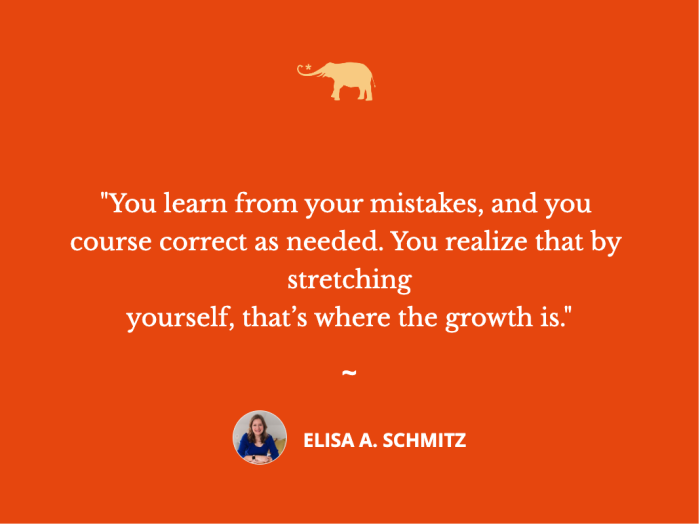The self-confidence you need to excel at something is created over time, through experiences in which you can learn and grow and master a certain skill. By starting small and accomplishing achievable tasks, you build up your ability and appetite for taking on bigger challenges. The more you succeed at the smaller stuff, the bigger the challenge you can tackle. One by one, rep after rep, your confidence grows.
You learn from your mistakes, and you course correct as needed. You realize that by stretching yourself, that’s where the growth is. You trust yourself to embrace opportunities, take greater risks, and accomplish your goals — even if they’re outside your comfort zone. Then one day, you realize there’s nothing you can’t do when you set your mind to it. That’s self-confidence. That’s what leads to being comfortable when others may not be. And that’s when you gain the advantage.
Being comfortable with being uncomfortable gives you an edge. Many people who feel uncomfortable in a situation will find a way to get out, to extricate themselves from it, just to end the discomfort. They prefer to remain in their comfort zones. If you can tolerate that awkward feeling and — even better — learn to thrive with it, chances are very good that you will succeed where others cannot. The power dynamic shifts, and their loss can become your gain.
Many of us have been trying our whole lives to fit in, just to avoid that uncomfortable feeling of being different in some way. You may stand out from those in the room, but being the only doesn’t have to feel awkward. By focusing less on what other people think of you, and more on what you think of you, you will feel more at home in your own skin. By embracing your differences as your superpowers, you will feel comfortable — or be able to push past discomfort — in any given situation.
Having a different culture or religion, being raised by immigrant parents, having an alternative sexual orientation — those differences help make you who you are. Learning to own them instead of feeling like you have to apologize for them — that’s how you gain the confidence you need to be comfortable, and even be a standout, wherever you may find yourself.
As a child, I was the only girl on my local youth baseball team. It wasn’t the most comfortable situation: I took a lot of teasing, and so did many of my teammates — simply because I was on the team. I was a tiger among lions, and the lions didn’t like me much.
Then there were those who underestimated me. They doubted my ability, solely based on my gender and size (I was rather petite). Members of opposing teams would often size me up based on my stripes and call me out as a weak link. Whether they thought I’d be an easy strikeout or they should hit to wherever I happened to be playing because I’d likely drop the ball, extra pressure and discomfort were always there. And this is why it was so satisfying whenever I proved them wrong.
The day of the big game, my discomfort was palpable. The stakes were as high as they’d ever been, and under the hot summer sun, my stripes were beacons for unwanted attention. As usual, the opposing team pointed me out right away. They snickered and I cringed. I felt like a target attracting arrows. There was a player on the opposing team whose talent was kind of legendary, so I’ll call him the legend. He was the cleanup hitter who usually could be counted on for a home run when it was needed most. As it turned out, it was needed in this championship game.
It was the bottom of the ninth inning with two outs, and we were ahead by a run or two. But the bases were loaded — and the legend was at bat. You could feel the tension on our side, and you could see the glee on their side. The opposing team was pretty sure they had this game in the bag with the legend’s impending grand slam. “Hit it straight out to center field!” the legend’s teammates yelled, smirking. Because, of course, that’s the position I was playing.
That’s when it started. My teammates looked at me, frantic. We were playing on a recreational park field, so there was no warning track or home-run fence. Just a city sidewalk and the busy street behind me. They waved their arms and yelled, “Get back! Further back! Even further back!”
As the legend stepped up to the plate, I jogged backward. And still, more arm waving, and more “Back! Back! Back!” As the ball was pitched, I was still jogging backward. That’s when I heard the telltale crack of bat hitting ball in that “Oh, shit!” sort of way. The kind of sound that tells you the ball is going back — straight to center field — straight toward me.
Looking into the sky, I saw the ball barreling my way. It was coming in hot, too fast, and I wasn’t in the right spot. But I believed I could get there. If I could just get myself into the right position, I knew I could catch that ball. I’d show everyone, especially myself, that I could do it.
Baseball cap on, I still squinted against the sun, my backward jog turning into a full backward sprint. My eyes, locked on the ball, constantly assessed where it was going in relation to where I was on the field. Mouth full of chewing gum, mitt raised to the sky, I went back, back, back — almost to the sidewalk — until I found the sweet spot where ball met glove. With a satisfying thump, the ball landed safely in my hands, and that is a sound I will never forget.
What came next was even more memorable. My team — whooping in victory (and relief ). The opposing team — jeering the legend for being “robbed” of his game-winning grand slam victory … by a tiny girl! Yes, a girl caught the would-have-been-a-game-winning-home-run fly ball cracked hard way out to center field. And a girl helped her team win the city championship.
After our victory, I was interviewed for the local news. I remember feeling excited and relieved at the achievement. I had owned that field, and the feeling stuck with me. It was a game changer in terms of how I felt about what I could handle, about my skills and abilities, about my self-confidence.
It hadn’t mattered that I’d been underestimated. In fact, that uncomfortable feeling of being underestimated may even have helped me because what those other players perceived to be a weakness had become a strength. I’d had something to prove, and I’d proven it. It hadn’t mattered that those doubters had thought I would never be able to catch that ball. What mattered was that I believed I could catch that ball. And I did.
Catching that ball, owning that baseball field, set the stage for my self-confidence propelling me forward. I learned to just be myself and to be confident in who I am. The confidence that came from owning my differences has made the difference, countless times, between failure and success.


 Share on bsky
Share on bsky





Read 0 comments and reply